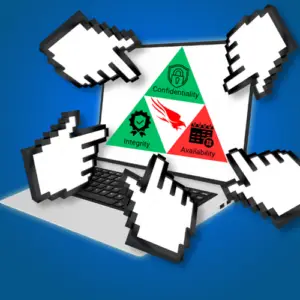The rapid evolution of the digital world demands fundamental shifts in how the United States allocates roles, responsibilities, and resources with respect to cyber security, and penetration testing is a key part of this shift. To address complex cybersecurity threats, on March 2nd, 2023, the Biden-Harris Administration released the National Cybersecurity Strategy, which focuses on two key philosophies: rebalancing responsibilities and realigning incentives.
The five pillars
Rebalancing responsibilities involves shifting the burden of cybersecurity away from small businesses, individuals, and local governments to organizations that have the resources to better manage cybersecurity risks. Meanwhile, a realignment of incentives requires changing existing incentives to encourage long-term investments in cybersecurity while striking a balance between defending infrastructures and effective incident detection and response.
As part of the approach outlined in the National Cybersecurity Strategy, collaboration around five pillars will be built and enhanced, including defending critical infrastructure, disrupting and dismantling threat actors, shaping market forces to drive security and resilience, investing in a resilient future, and forging international partnerships to pursue shared goals. Penetration testing services will be a critical component to the success of this strategy.
How does penetration testing come into play?
Penetration testing services provide a method for evaluating the security of computer systems, networks, or web applications by simulating an attack from a malicious threat actor. By conducting penetration testing, organizations can identify vulnerabilities and take action to mitigate them before they are exploited to impact the confidentiality, integrity, and availability of critical systems and data.
To effectively identify and address vulnerabilities of importance, it’s essential that penetration testing services simulate realistic levels of threat by utilizing the same or similar Techniques, Tactics, and Procedures (TTPs) that are used by modern threat actors. Penetration testing services that rely on commercial off-the-shelf tools (COTS) such as automated vulnerability scanners are not always ideal for testing critical infrastructure due to potential fragility and sensitivity.
Discover more than just vulnerabilities
Realistic threat penetration testing is a more advanced tier of penetration testing service that focuses on leveraging the same or similar TTPs as real-world threat actors. These advanced penetration testing services do not have a dependency on automated vulnerability scanning although scanners can be used, if appropriate, to increase efficiency and provide coverage for easy-to-find vulnerabilities. When it comes to testing critical infrastructure, or other sensitive targets, realistic threat penetration testing is recommended because of it is low risk as it relates to the potential for causing outages and damages.
Moreover, traditional penetration testing services identify vulnerabilities, while realistic threat penetration testing services identify vulnerabilities and paths to compromise. A path to compromise is a path available to a malicious attacker to breach an infrastructure, then access and exfiltrate (or manipulate) sensitive data. Organizations that know their paths to compromise can build effective, efficient, and targeted defenses, whereas organizations that don’t are often flying blind. In conclusion, the National Cybersecurity Strategy sets out a path to address complex threats and secure the promise of our digital future. As part of its approach, the Strategy seeks to build and enhance collaboration around five pillars, including defending critical infrastructure, disrupting and dismantling threat actors, shaping market forces to drive security and resilience, investing in a resilient future, and forging international partnerships to pursue shared goals. Penetration testing is a critical tool that can help the Biden Administration achieve these objectives and secure the full benefits of a safe and secure digital ecosystem for all Americans.
Need help with your penetration testing needs? Contact Netragard Today.






